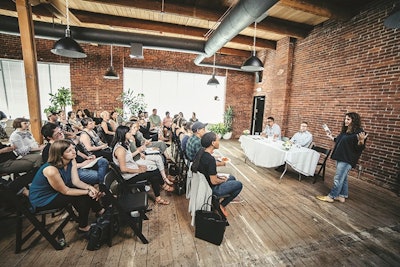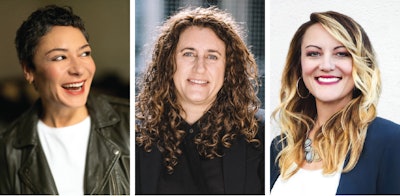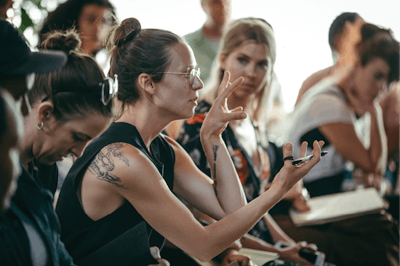

Women hold less than one-quarter of senior positions in the global workforce. As women work to shatter the “grass ceiling” and make their mark in cannabis, three women are leading the charge, creating classes, resources, communities and offering one-on-one support to help women launch, fund and grow their businesses and succeed in the cannabis industry.
Sara Batterby, The Batterby Group
When Sara Batterby moved to Portland, Ore., to start HiFi Farms, she discovered a dearth of networking opportunities for women in cannabis. In the process of building a venture-backed cannabis brand, Batterby garnered a lot of attention for her high-profile funding efforts, which brought in $4.5 million in seed funding between 2015 and 2017.
“Raising capital in cultivation is challenging because the wholesale prices are coming down and businesses are struggling with the new market realities,” she explains. “To make this worse, cultivation is a very expensive business to build, ... [and] few people who are experts in growing cannabis have the background, network or experience to make that kind of raise an option.”
Batterby started fielding invitations to speak about cannabis fundraising from groups like NCIA Oakland, Cannabis Grand Cru and Cannabis Collaborative Conference and, through those appearances, started receiving requests from women who needed funding to launch or scale their cannabis businesses. In 2017, Batterby agreed to work with Christine De La Rosa, the co-founder and CEO of the People’s Dispensary, a retail dispensary in Portland with an emphasis on providing cannabis to marginalized communities, including LGBTQ, women, seniors, disabled and people of color.
“[De La Rosa] reached out to me, and she was very persuasive; she talked me into taking her on. I remember saying to her, ‘I don’t consult. I don’t have a consulting agreement. I have no idea how to charge for something like this. I don’t do it,’ and she said, ‘I need you to do this. I need you to help me,’” Batterby recalls.
The pair worked together once a week for three months. De La Rosa opened a seed round hoping to raise $2.2 million; investors committed $6 million within weeks of the launch. The success led Batterby to rethink her role in the cannabis industry.
“I very quickly realized that all of the networking, and the support, and the events, and the love, and the camaraderie wasn’t going to help these women … scale their companies to compete and take advantage of the market,” she says.
Batterby established The Batterby Group in January 2018 with a goal of helping startups maximize their funding success. To date, she’s completed six fully funded seed raises and helped companies generate up to $60 million in committed and closed capital. Although she works with founders in a range of industries, the Portland-based business has a special emphasis on women—including women of color—and cannabis.
The Batterby Group’s two programs are aimed at providing women with the tools to secure funding, including needs assessments, defining investment strategies, preparing financials and crafting investor engagement road maps. The Courting Angels program helps first-time fundraisers prepare to launch their first capital raise, while The Reboot supports founders who are coming back from a stalled or failed raise.
“Women build relationships. We get to know one another. We build trust. We create a connection, and then we see if there’s a deal to be made,” Batterby explains. “And I … think there’s a skill set that [women have] that allows them to use their feminine leadership strengths, and their innate and intuitive strengths around communication and connection, to make them extremely effective at fundraising.”
Batterby has made it her long-term goal to help women gain “access to capital, to build up companies and sell them,” she says, so they can become investors [to build their own wealth]. She believes that if women can succeed in cannabis fundraising, they can not only secure their place in the industry, but also make positive societal change.
“The only way we’re ever going to make change [in the industry] … [is by] giving women the economic power to be making decisions around where the money goes in cannabis and [beyond],” she says. “It’s demanding work emotionally, but it’s the most rewarding thing I’ve ever done.”
Kyra Reed, Kadin Academy
Although marketing and social media veteran Kyra Reed had a long history of working with entrepreneurs through her firm, Markyr Digital, she realized that women launching cannabis businesses had specific needs.
“Most women in cannabis are focused on saving the world,” she explains. “[In working with them,] I realized that there were a lot of women who wanted to make products or grow [cannabis] and had a passionate belief in what the plant can do and the opportunities to mainstream it, but that passion wasn’t always coupled with business acumen.”
Reed started reaching out to her network, asking women in industries ranging from law and finance to public relations and advocacy to create recorded lessons that could help female cannabis entrepreneurs succeed. Reed called the venture Kadin Academy. Members can access video lessons of PowerPoint presentations narrated by mentors like Heidi Groshelle of Ingrid Marketing, Jamie Cooper of CannaMedia, and Shabman Malek and Amanda Coley of Brand and Branch. Worksheets accompany the virtual classes, and mentors are available to answer questions.
In 2017, at the same time she launched Kadin Academy, Reed also created a private Facebook group, Women Entrepreneurs in Cannabis. The virtual community has attracted more than 4,100 members. Membership in Kadin Academy, which includes a Cannabis Business Startup Course, training videos and webinars has grown, too, attracting cultivators, distributors, dispensary owners, product manufacturers and ancillary service providers.
“It is a pretty broad group because the one galvanizing part of it is that we are here to help each other, and we are building a community,” Reed says. “What we’re building here is a new movement; we’re realizing that we don’t have to come into this male-dominated world, that we can actually do it differently.”
By offering resources tailored to women in cannabis and building a community to help them succeed, Reed hopes to shift the balance of women in the industry—but making that happen has required navigating some roadblocks.
Currently, Kadin Academy is “really focused on getting new members,” Reed says, pointing to the company’s new pricing structure, which has lowered prices from $1,000 for the Cannabis Business Startup Course to $120 per year for access to all Kadin Academy resources, in an attempt to increase enrollment.
By making the resources more accessible, Reed hopes she can help more women enter (and succeed in) the industry. Her long-term goal is to see women make up at least 50 percent of the entrepreneurs and at least 50 percent of C-suite executives in the cannabis industry.
“There is all of this data that shows that women kick ass at being entrepreneurs—then you look at the other side of the data, which is how much women are getting funded, and it’s abysmally low,” says Reed. “It’s the way that things have been going for a very long time, and we have to shift and change. It’s going to take a lot of work, and it is going to take all of us locking arms and really focus[ing] on solving this problem.”
Kadin Academy started hosting Mentor Monday, interviewing women in cannabis about hot topics in the industry, further empowering members to engage with experts, acquire knowledge and connect with each other to help grow their businesses. Wendy Kornberg of Sunnabis, Humboldt’s Full Sun Farms, and those at Arcanna Flowers are among the cultivators featured in this weekly social media broadcast.
“I created this community because I wanted women to know that there is a place for them in this industry; there are opportunities,” she says. “The one thing I most want women who are considering making the leap to cannabis or getting more involved in cannabis to know is that there is a community here for you.”

Amy Margolis, The Initiative
Oregon-based attorney Amy Margolis has been advising the cannabis industry since 2002. As the number of states legalizing medical and recreational cannabis use increased, so did the number of new ventures aiming to address a growing demand—and Margolis recognized a troubling trend.
“Cannabis went from being this alternative industry to looking like male-dominated corporate America and mirroring some of the same problems we have in corporate America,” she explains.
After returning from an industry conference in 2017, where she said she was often one of the few female attendees in the room, Margolis decided to use her connections and experience as a prominent cannabis attorney and founder of the Oregon Cannabis Association to create an accelerator program for female cannabis entrepreneurs and executives, called The Initiative. The program welcomes its first class in January 2019.
The Portland, Ore.-based business accelerator will bring together eight companies (that must have at least one female founder or chief decision maker) for three months of intensive programming that includes: business assessments, strategic decision-making, setting valuations and developing funding [needs], as well as leadership, mentoring and networking opportunities. At the end of the accelerator, women will pitch their companies to investors and, Margolis hopes, secure funding.
“Women, across the board and in the cannabis space, have a hard time raising money,” she explains. “We’re hoping to be able to fund all of the women who go through the program to prove that we can fund women-owned cannabis businesses and those businesses can be successful.”
Although there was a lot of interest in participating in The Initiative (the accelerator received 70 applications for eight spots; the board of directors was tasked with selecting the finalists), attracting investors proved challenging.
“There were a lot of high net-worth individuals who wanted to be involved and wanted to help women, but there were also plenty who were ‘eh’ about the whole idea,” Margolis recalls. “Once I changed the language and started talking about [investing in an underrepresented segment of the industry] and not, ‘let’s help women be successful,’ they were interested.”

In the cultivation space, Margolis believes that investors are interested in eco-friendly operations, noting, “It’s a selling point, [so] it’s important that we focus on being green as we build bigger and bigger facilities.”
While Margolis is excited about The Initiative, she acknowledges that it’s a single program and that achieving gender equality in the cannabis industry will require a much broader effort. Her goal is to introduce programming for businesses of all sizes and stages with the aim of helping women raise funds to start or expand cannabis enterprises.
As part of her commitment to supporting the cannabis community, Margolis opened The Commune this summer. The brand-new events venue in Portland offers cannabis-friendly classrooms, meetings and event space, hosting “Tokeativity Socials,” Students for Sensible Drug Policy fundraisers and Oregon Cannabis Association events.
Margolis also launched the Hustle Hard: For Women Who Mean Business retreat in October. The three-day retreat at Brasada Ranch in Bend, Ore., brought together executives and educators—including Emily Paxhia of Poseidon Asset Management, J. Summer Rogers of Rogue Venture Partners, and Christine Smith of grön, makers of cannabis-infused chocolates—to tackle topics such as business basics, corporate governance, fundraising and deal negotiation. It was a sold-out event, attracting 150 women—and Margolis believes she could have sold twice the number of tickets if space was available.
“To impact a lot of people, we need to be in a lot of places, [and] the more female founders we can impact, the broader the reach will be in terms of diversity across the entire cannabis industry,” she says.
Top photo: Margolis at an Oregon Cannabis Association event for women that was held at The Commune—a 4,000-square-foot, cannabis business-friendly event, office and boardroom space located in Portland. Photo courtesy of The Initiative

























